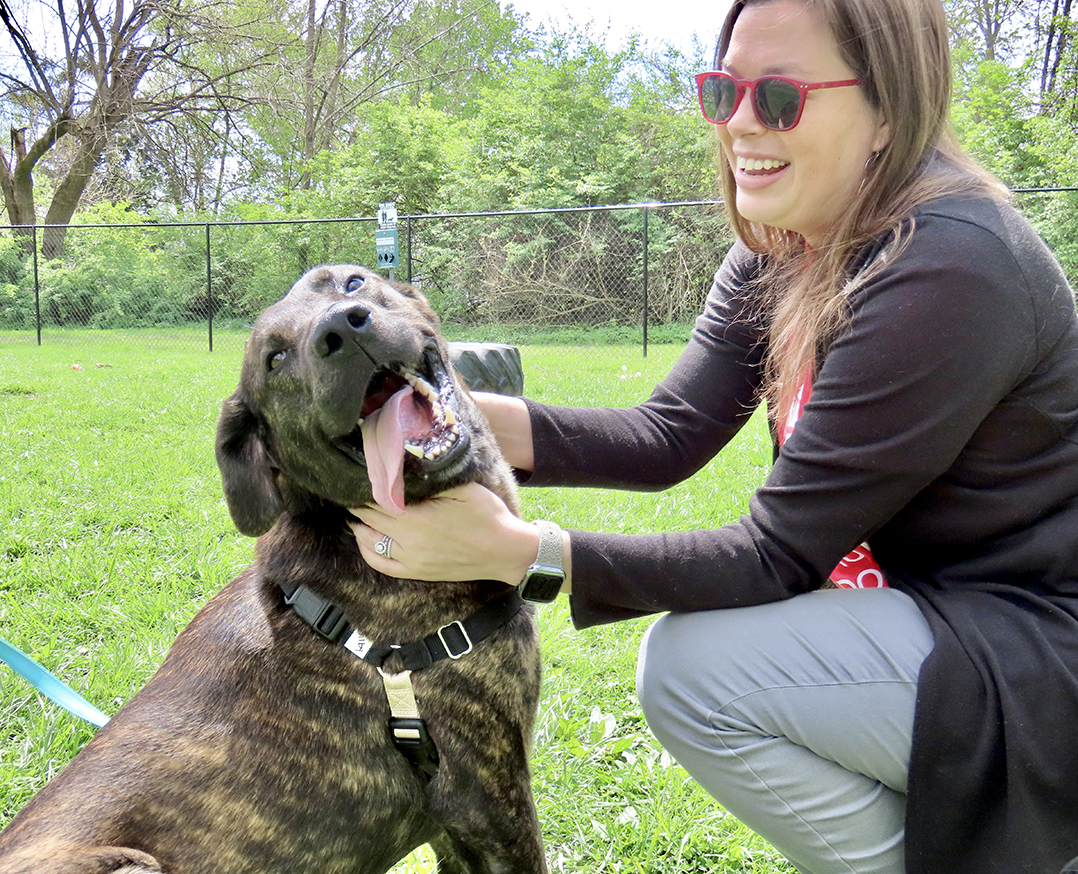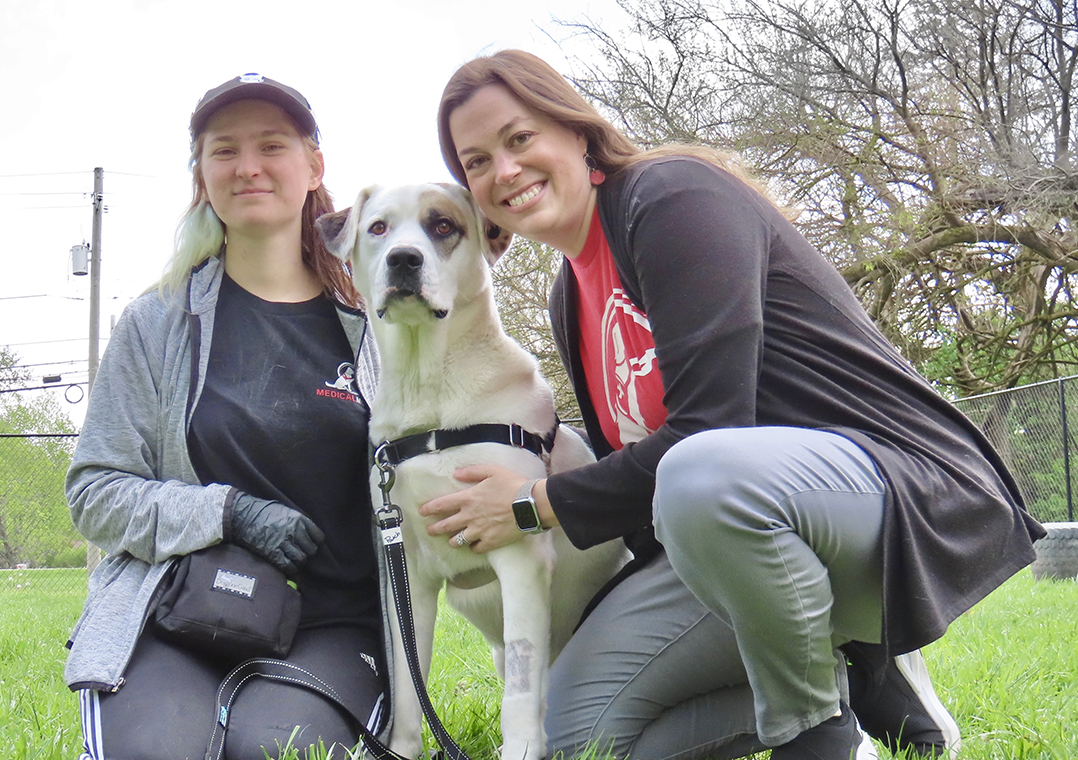There was no pomp and circumstance, but there were a lot of wagging tails as seven very good dogs and their new humans graduated from the Medical Mutts service dog program on April 18.
“Tonight, we’re going to celebrate all of you,” Medical Mutts Director of Development Kelsey Burton said to the graduates. “You’ve worked incredibly hard over the last 10 days to get to this point, and we know how hard this is. And we’re just really proud of each of you and all the work that you’ve done. We know you’ve grown and bonded, and you’re now starting this incredible, life-changing journey together.
“The service dogs are improving independence for their people, and the people are providing a loving home and purpose for these great dogs.”
Medical Mutts is celebrating its 10-year anniversary this year, Burton told the group of supporters and clients gathered at the Delaware Township Community Center in Fishers. The nonprofit was founded in 2013 with the idea that shelter dogs can be trained to help people. The program takes shelter dogs that show potential for service work and starts the training process with the help of staff and volunteers.
Burton said only 25 percent of the dogs they take from shelters end up as service animals. The rest are adopted out to good homes as pets.
One of that 25 percent is Chai, a German shepherd who became guest speaker Kathleen Simmonds’ service dog a couple years ago. Simmonds, who lives in Missouri, told the graduates that the best advice she can give is to let go of expectations.
Chai is Simmonds’ second service dog through Medical Mutts. She said her first dog, Emma, bonded with her immediately, which made the ongoing training easy. Chai, though, had a rough start in life and wasn’t ready to bond with her right away.
“He decided that I needed to work for his trust and his respect,” Simmonds said. “I had to drop my expectations when I got Chai.”
Before his new life as a service dog, Chai had been neglected and left tied up outside during harsh winter weather. A companion dog who also had been left outside died of exposure, she said, and Chai lost the tip of one ear to frostbite.
Simmonds said she decided to work on bonding, rather than on the service Chai was trained to provide, which is alerting her when her blood sugar spikes or drops.
Since Chai loves playing ball, they did a lot of that, along with walks and random snuggles. Their bond did get better, but slowly. After six months, she said, they had a breakthrough. Following a walk, Chai did a play bow and zoomies with Simmonds.
“He was being his goofy self,” she said. “I had seen this with my husband multiple times, but never with me. He ran straight to me. We played. Chai loved on me. I cried.”
After that, Simmonds said she still had to work with her dog daily, but he started alerting her when her blood sugar levels were too high or low, and their relationship continued to improve. Now, Chai is a great service dog and a great companion.
Simmonds said there are some expectations that the graduates can hold onto.
“Expect your dog to change your life for the better, and not just for the reason why you acquired a service dog,” she said. “They will change all aspects of your life. My top tip for you is to let time be your greatest asset, and not let expectations throw you off course. You should enjoy all your new adventures and enjoy the teammate you now have to help you, because they love you unconditionally and there’s nothing better than that kind of love.”
The graduating dogs and their new people appeared to feel the love. They each had their moment in the spotlight and received their graduation papers and a gift bag. The services that the dogs will provide vary from emotional support for autism and anxiety, to seizure and diabetes alerts, to mobility support. They will be going home with their people to Colorado, Texas and Pennsylvania, and to nearby Noblesville.
For more about the nonprofit, go to medicalmutts.org.

Medical Mutts train for many tasks
The April 18 graduation ceremony included a demonstration of some of the actions Medical Mutts dogs are trained to perform.
Dug the Labrador retriever helped with the demonstrations. He showed how trained dogs can assist with anxiety by getting on their person’s lap and providing comforting pressure to relieve anxiety.
Dug also was trained to interrupt potentially damaging repetitive behaviors that some people with anxiety exhibit, such as scratching themselves.
A person also can use their service dog as an excuse to leave a situation. The dogs are trained to ask to go outside in response to a “secret” signal from their person.
Service dogs can act as a barrier between their person and others, helping to maintain a comfortable distance.
The dogs are trained to detect and give an alert if their person is experiencing specific symptoms that create a scent. That includes anxiety, blood sugar spikes, or a seizure. The dogs also are trained to fetch medication if the person is not able to; and to press a button that calls for help.
Medical Mutts Director of Development Kelsey Burton said the organization has a “tiny and mighty” staff that provides the training before the dogs are matched with their new people. They also rely on volunteers to help in many ways.
Burton said the organization is always looking for volunteers, and they are well compensated.
“They get doggy snuggles,” she said. “That’s how we pay them — puppy tax.”
For information about how to volunteer, go to medicalmutts.org.



